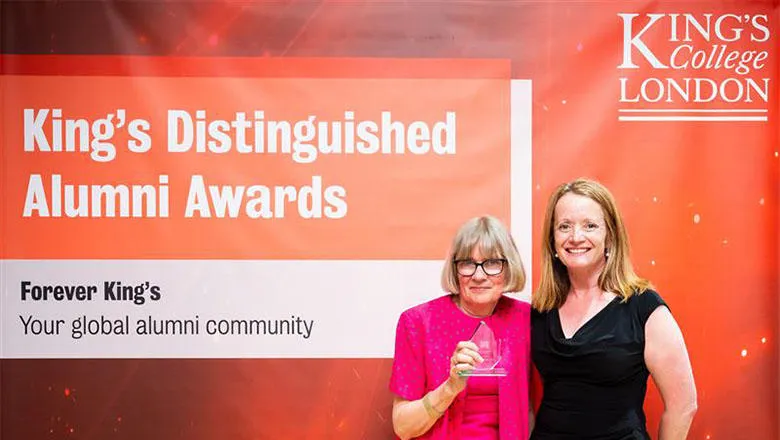 Dr Rachel Baggaley OBE, winner of our Global Health Award, with Professor Nicki Cohen, Dean of Medical Education at King’s
Dr Rachel Baggaley OBE, winner of our Global Health Award, with Professor Nicki Cohen, Dean of Medical Education at King’s
What attracted you to study medicine?
I don’t come from a medical family. I also studied art at A Level. I remained torn between art and medicine until I saw an exhibition by Mark Rothko. I remember thinking, ‘Wow! I’ll never be able to paint like that!’ So I chose medicine. I’ve never regretted the decision.
What’s your favourite memory of your time as a student?
I did my undergraduate clinical medicine degree at St Thomas’ Teaching Hospital, then I did a masters at Guy’s. St Thomas’ had amazing views across the River Thames. Even now, I’m still blown away by that area of London. It’s beautiful. There’s the South Bank, the Hayward Gallery, the National Theatre and the British Film Institute.
How was life as an undergraduate medical student in 1980s?
St Thomas’ wasn’t a great fit for me. It was very conservative, very male, and a lot of the doctors and consultants who taught you were quite sexist. Many of the male intake were rugby players and part of the old boys’ network. It wasn’t a great place to be a woman.
But there were good people there, too. I made friends who I’m still in contact with today.
What was it like studying for your masters?
I did my masters about eight years later at Guy’s and that was an amazing experience. As an undergraduate, medicine involved a lot of rote learning. My masters was more mentally stimulating and the teaching was excellent.
You’ve won our Global Health Award for your work in HIV, hepatitis and STI prevention. How did your journey into this area begin?
When I finished my training, I joined the academic GP practice at St Thomas’. You worked as a GP, but you were also involved in public health research.
At that time in the 1980s, HIV started to be recognised in the UK, particularly among people who injected drugs. I got involved in what was called ‘harm reduction’. I worked alongside colleagues at the Maudsley Hospital to create a sort of pop-up shop. It was where people who injected drugs could get clean needles and syringes, a cup of coffee and health information and be linked to methadone programmes.
The UK was forward thinking about HIV prevention for people who used drugs. It took a public health approach. In many other parts of the world, the response was more punitive.